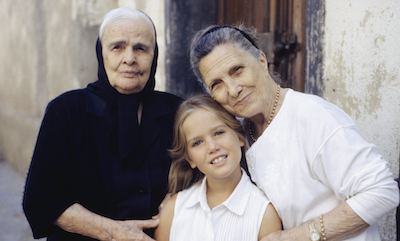Centenarian Offspring Feel Stronger Purpose in Life.
 A sense of meaning and direction in life is associated with living longer and experiencing less disease, disability, and cognitive impairment.
A sense of meaning and direction in life is associated with living longer and experiencing less disease, disability, and cognitive impairment.
Now, a new study co-authored by School of Public Health researchers has found that the children of centenarians, who tend to have similar healthy aging patterns and long lives like their parents, are also much more likely than the general population to have a strong sense of life purpose.
The study, the first to examine purpose of life (PIL) in centenarian offspring, was published in The Journals of Gerontology, Series B.
“Aging well is not only escaping or delaying disease,” says co-author Paola Sebastiani, professor of biostatistics. “Feeling good about your life is important and should be considered an important aspect of healthy aging.”
The researchers used data from the BU-based New England Centenarian Study (NECS), which has recruited almost 4,000 centenarians, and some of their siblings and children, since 1994. The researchers compared the children of centenarians, who averaged 82 years old, with three other groups: their spouses; their birth cohort, made up of people whose parents were born around the same time as the centenarians but lived on average only into their early 70s; and participants in the Health and Retirement Study (HRS), a nationally representative study of more than 30,000 individuals over the age of 50.
The researchers compared PIL in the four groups using the PIL scores from the Ryff Scales of Psychological Well-Being. The Ryff PIL scale uses statements such as, “I enjoy making plans for the future and working to make them a reality” and, “My daily activities often seem trivial and unimportant to me,” with respondents using a six-point scale from “strongly disagree” to “strongly agree.”
Defining high PIL as scoring in the top quartile of the participants with a score at or above 5.85 out of 6, the researchers found 30 percent of the centenarian offspring had high PIL, compared to 21 percent of their spouses and only 14 percent of the birth cohort of septuagenarian offspring. Comparing the centenarian offspring with the HRS participants, with a top quartile cutoff score of 5.43, 41 percent of the centenarian offspring had high PIL, compared to only 19 percent of the HRS participants.
Adjusting for age, sex, education, and marital status, the researchers found that children of centenarians had 1.92 times the odds of high PIL as their spouses, 2.64 times the odds as the birth cohort participants, and 2.93 times the odds as the HRS participants.
The authors noted individuals tend to partner with people who have similar physical and psychological traits, which may account for the smaller difference in scores between the children of centenarians and their spouses. The spouses were also younger than the centenarian offspring on average, and by definition were more likely to be married, both of which are associated with higher PIL, the authors wrote.
“Having goals and making plans to work toward them may keep you more engaged with activities and social relationships, and give you a greater incentive to maintain good health and function,” says senior author Stacy Andersen, assistant professor at the School of Medicine. “Alternatively, low PIL may be a signal of unhealthy aging.”
SPH doctoral student Katherine Bloore was a co-author of the study, which was led by MED student Sarah Marone. The other co-authors were Christopher Flynn, Brittany Leonard, Kelsey Whitaker, Marilyn Mostowy, and Thomas Perls, all from the Geriatrics Section of the Department of Medicine at MED and Boston Medical Center.